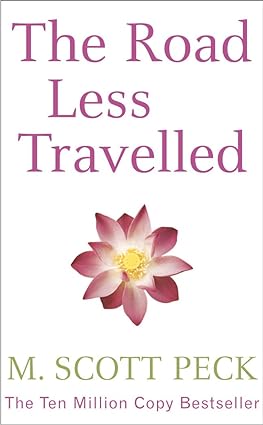The Road Less Travelled By M Scott Peck Book Review
“The Road Less Traveled” by M. Scott Peck is a timeless classic in the field of self-help and personal development. First published in 1978, it has continued to resonate with readers for decades, and its insights remain as relevant today as they were when it was first written.
Peck, a psychiatrist and psychotherapist, begins the book with a deceptively simple statement: “Life is difficult.” From this seemingly obvious truth, he builds a profound and thought-provoking exploration of human nature and the path to true fulfillment. The book is divided into four parts, each addressing a key aspect of personal growth and self-realization.
Part I, “Discipline,” delves into the importance of self-discipline and delayed gratification in achieving a fulfilling life. Peck emphasizes that taking responsibility for one’s actions, accepting the challenges of life, and making choices that require effort and sacrifice are essential for personal growth. He encourages readers to embrace the difficulties of life as opportunities for growth.
Part II, “Love,” is a particularly illuminating section of the book. Peck explores the complexities of love, distinguishing between genuine love, which requires effort and dedication, and the illusion of love, which is often based on dependency and infatuation. His insights into the nature of love, both for oneself and for others, are both profound and practical.
Part III, “Growth,” focuses on the stages of human spiritual development. Peck introduces the concept of the “healthy personality” and describes the process of spiritual growth as a lifelong journey. He explores the importance of a balanced life, open-mindedness, and a willingness to continually learn and evolve.
Part IV, “The Grace of God,” addresses the spiritual dimension of life and the role of religion and spirituality in personal growth. Peck, though a psychiatrist, approaches this topic with respect and openness, discussing various spiritual belief systems and the role they play in individuals’ lives.
One of the book’s strengths lies in Peck’s ability to blend psychology, philosophy, and spirituality into a cohesive framework for personal development. He writes with clarity and authenticity, using both clinical examples and personal anecdotes to illustrate his points. Peck’s writing style is accessible, making complex concepts understandable to a wide range of readers.
However, some readers may find the book’s structure somewhat disjointed, as it weaves between psychological insights, spiritual reflections, and practical advice. Additionally, Peck’s approach to religion and spirituality may not resonate with all readers, as it leans more toward a traditional Judeo-Christian perspective.
In conclusion, “The Road Less Traveled” is a thought-provoking and timeless work that offers valuable insights into the journey of self-discovery and personal growth. While it may not provide all the answers to life’s complexities, it serves as a guide for those seeking a deeper understanding of themselves and the path to a more fulfilling existence. M. Scott Peck’s wisdom continues to inspire and guide countless individuals on their own road less traveled.

